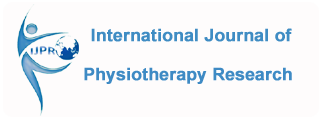IJPR.2017.221
Type of Article: Original Research
Volume 5; Issue 5 (October 2017)
Page No.: 2420-2423
DOI: https://dx.doi.org/10.16965/ijpr.2017.221
IMMEDIATE EFFECT OF DEEP BREATHING EXERCISE ON HEALTHY SUBJECTS
Poonam Nariyani *1, Harita Vyas 2.
*1 Post graduate student, Cardiopulmonary Department, S.B.B. College of physiotherapy, Ahmadabad, Gujrat, India.
2 Lecturer, Cardiopulmonary Department, S.B.B. College of physiotherapy, Ahmadabad, Gujrat, India.
Address for correspondeces: Poonam Nariyani, S.B.B. college of physiotherapy, Ahmedabad, Gujarat, India. E-Mail: poonamnariyani63.pn@gmail.com
ABSTRACT
Background: A behavioral task frequently used to assess distress tolerance is the breath holding task. The immediate effects of deep breathing exercises have different types of benefits like significant decrease of atelectatic area, increase in aerated lung area and a small increase in PaO2 is well known. There exists an interrelationship in normal healthy persons between resting HR, RR & BP and breath bolding capacity. By adding the DBE in routine physiotherapy; we can improve the distress tolerance as well as lung capacity in healthy individuals.
Materials and Methods: 60 healthy subjects with the age of 20-25 years at Physiotherapy College, Ahmadabad was included for the study. Subjects on medication or not willing to participate were excluded. Experimental study (pre and post) was conducted with purposive sampling. Height, weight, BMI, PR, RR, SpO2, PEFR & breath holding time was recorded. Then subjects were instructed to perform DBE for 5 minutes (6 breaths/min). This was followed by recording of PR, RR, SpO2, PEFR and lastly breath holding time. Data was analyzed by using SPSS 16 by keeping the level of significance at 5%. Wilcoxon test was used to see the statistical significance.
Results: PEFR, SpO2 and breath holding time is found to be significantly increased (p=0.00) with significant decrease in PR, RR (p=0.00) in young adults of both genders.
Conclusion: The result indicates that the deep breathing exercise has an influence on parasympathetic nervous system. The increased PEFR can be due to decreased in small airway resistance.
KEY WORDS: Deep breathing exercises, Breath holding capacity, PEFR.
REFERENCES
- Ravi G.N, K.N. Narasimha Swamy. EFFECT OF “DEEP BREATHING” ON PULMONARY FUNCTIONS IN HEALTHY YOUNG INDIVIDUALS. Journal of Evolution of Medical and Dental Sciences 2013;2(32).
- Telles S, Nagarathna R, Nagendra HR. Breathing through a particular nostril can alter metabolism and autonomic activities. Indian J Physiol Pharmacol 1994;38:133-7.
- Pramanik T, Sharma HO, Mishra S, Mishra A, Prajapati R, Singh S. Immediate effect of slow pace bhastrika pranayama on blood pressure and heart rate. J Altern Complement Med 2009;15:293-5.
- Joseph CN, Porta C, Casucci G, Casiraghi N, Maffeis M, Rossi M, et al. Slow breathing improves arterial baroreflex sensitivity and decreases blood pressure in essential hypertension. Hypertension 2005;46:714-8.
- Pinheiro CH, Medeiros RA, Pinheiro DG, Marinho Mde J. Spontaneous respiratory modulation improves cardiovascular control in essential hypertension. Arq Bras Cardiol 2007;88:651-9.
- Bernardi L, Spadacini G, Bellwon J, Hajric R, Roskamm H, et al. (1998) Effect of breathing rate on oxygen saturation and exercise performance in chronic heart failure. Lancet 351:1308–1311.
- Sukhdev Singh. Effects of a 6 week nadishodhan pranayama training on cardiopulmonary parameters. Journal of Physical Education and Sports Management 2011;2(4):44-47.
- Cropp GJ. Relative sensitivity of different pulmonary function tests in evaluation of exercise-induced asthma. Pediatrics. 1975 Nov;56(5 pt-2 suppl):860-7.
- C.B, Dharwadkar AA, Dharwadkar AR. Comparative Study of the Immediate effect of Deep Breathing Exercise Coupled with Breath Holding up to the Breaking Point, on Respiratory Rate, Heart Rate, Mean Arterial Blood Pressure and Peak Expiratory Flow Rate in Young Adults. Medical Science 2013;1(2):33-38.
- G Sivakumar, Prabhu K.M, Baliga R, Pai M.K, and S. Manjunatha, Acute effects of deep breathing for a short duration (2-10 minutes) on pulmonary functions in healthy young volunteers. Indian J Physiol Pharmacol 2011;55(2):154-159.
- Bernardi L, Porta C, Spicuzza L, Bellwon J, Spadacini G, et al. Slow breathing increases arterial baroreflex sensitivity in patients with chronic heart failure. Circulation 2002;105:143-145.
- Hayano J, Yasuma F, Okada A, Mukai S, Fujinami T. Respiratory sinus arrhythmia. A phenomenon improving pulmonary gas exchange and circulatory efficiency. Circulation 1996;94: 842–847.
- G Sivakumar, Prabhu K.M, Baliga R, Pai M.K, and S. Manjunatha, Acute effects of deep breathing for a short duration (2-10 minutes) on pulmonary functions in healthy young volunteers. Indian J Physiol Pharmacol 2011;55(2):154–159.












 Users Today : 35
Users Today : 35 Users Yesterday : 248
Users Yesterday : 248 This Month : 3261
This Month : 3261 This Year : 16165
This Year : 16165 Total Users : 117938
Total Users : 117938 Views Today : 59
Views Today : 59 Total views : 435951
Total views : 435951 Who's Online : 4
Who's Online : 4